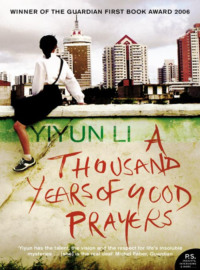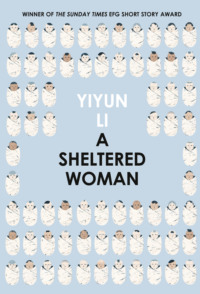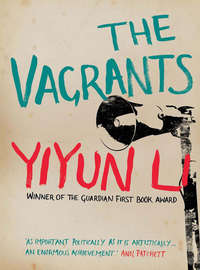
Полная версия
Gold Boy, Emerald Girl
THREE
BY OUR THIRD week in the army everyone in my squad had received a letter from home; a few had received additional letters from their friends. Without fail all of them cried when they read them. Ping, the youngest among us, fifteen and a half, doubtless a genius to have graduated high school that young, read aloud her father’s letter between sobs: “After you registered and went into the barracks, Baba cried on the way to the train station. The night train from Wuhan to Beijing was fully packed, and Baba stood for eighteen hours, but that, compared to Baba’s little darling’s suffering in the army, was nothing. I have the calendar on my wall, and every morning I mark a day off, knowing it is one day closer to our reunion.”
I was the only one, by the fourth week, not to have received a letter. “Are you sure you don’t want to write to your parents again?” asked Nan, who stood next to me in line for the formation drill and slept in the bunk bed above me. “Your last letter might have got lost, and they might not have the address to write to you.”
I shook my head. I had sent a postcard to my parents the first week, saying nothing but that I had arrived safely. My father was not the type to write a letter, and secretly I was relieved that my father was not like Ping’s, who would continue sending letters filled with unabashed words of love, which Ping never hesitated to share. My mother might write me, on a whim, a letter filled with quotations from ancient poems, but then again, she might have decided to cut me out of all communications.
At the end of the week I was summoned to Lieutenant Wei’s room. It was a Sunday, and we had the morning off from drills. She motioned for me to take the only chair, and I moved it away from her before sitting down in the middle of the room. There was a single bed on my left, with an army-issue quilt, blanket, and sheet. There was no pillow on her bed, and I wondered if she wrapped up some old clothes as we did at night, or if she had a pillow hiding in her closet. On the wall next to the bed were a few framed photographs. A black-and-white one stood out. A young girl, thirteen or fourteen, looked away with a smile, as if she had been teasing the photographer. “That was taken the summer before I enlisted,” Lieutenant Wei said as she studied me. “Have you been out to town yet?”
“No, Lieutenant,” I said. She only had to check her chart to know that I had never requested one of the two-hour permits to visit town on Sundays.
“Why? The town is too small for someone from Beijing to visit?”
I thought about the question, which, like all questions put to us by an officer, could have many traps. There was no particular reason, I said. I could have said that I wanted to give the opportunity to the other girls, who were more eager to have the two hours of freedom, but that would have led to more questioning. I had learned, in the past few weeks, that an officer’s friendliness was not to be trusted. Lan, a girl whose hometown was in the same province as Lieutenant Wei’s hometown, once had an amicable chat with Lieutenant Wei at a drill break, but five minutes later, when Lan made the mistake of turning right when the rest of us turned left, Lieutenant Wei ordered her to leave the formation and do a hundred turn-lefts. Even worse, Lan was to give herself the drill command, and by the time she reached thirty, her voice was choked by her tears. Lieutenant Wei, while the rest of us watched with anxiety, told Lan that if she did not make the command clear and loud to all who were witnessing her punishment, it would not count. Similar incidents had happened to others: A girl was ordered to stand in the middle of the mess hall during a meal after she had laughed at a joke told quietly to her by a squad mate; another girl was asked to read a self-criticism in front of the company because she had claimed the food from the mess hall was better suited for feeding pigs than human beings. These punishments were measured out not only by Lieutenant Wei and the other junior officers, but also by Major Tang, the commander of our company, who, as the only male officer, liked to storm through the barracks for unannounced inspections.
When I did not reply, Lieutenant Wei changed the topic and said that she had heard that I hadn’t yet received a letter from home. I wondered who had reported this to her, but perhaps this was how the army worked, details about our lives recorded by informants among us. My parents are not the type to write letters, I said.
“Is that a problem for you?”
“A problem, Lieutenant?”
“Would you like to phone them?” Lieutenant Wei said. “I could arrange for you to make a phone call to your parents if you wish.”
My parents did not own a telephone. The nearest public telephone was a few blocks from our building, guarded by a brusque middle-aged woman. A message would be taken but would not be delivered until the end of the day; she was paid as a government worker, her salary at a set level, so she rarely inconvenienced herself to deliver even the most urgent messages. Once in a while when the residents filed complaints, she would for a week or two put the callers on hold and send her teenage son around the neighborhood. “A phone call for number 205,” he would call out in front of a building, his voice no longer a child’s but not yet a grown man’s. He was said to be slow, so no school would admit him, and he spent his days, if not as a companion to his mother, then running around the neighborhood and intimidating young children with incoherent ghost stories. My mother would never respond to such a boy calling our flat number in that manner, nor would she be willing to make a trip to the phone booth to call me back.
I told Lieutenant Wei that there was no need to make a call, as my parents did not have a telephone at their place.
“And a neighbor? A friend living nearby?” Lieutenant Wei said. “Anyone who could receive a phone call on their behalf so they know you are well?”
The only telephone number I knew—though I had never used it—was Professor Shan’s. It was written on a slip of paper, in her neat handwriting, and taped on the red telephone next to her single bed. I had studied the number many times while she was reading a long passage, and after a while I could not get it out of my mind.
There is no one I could call, I said when Lieutenant Wei pressed me again. She studied my face as if trying to decide if I was lying out of defiance. She retrieved a file folder from a drawer, and pages rustled under her impatient fingers. I looked out the window at the evergreen trees, wishing to be one of them. I loved trees more than I loved people; I still do. Few creatures are crueler than human beings, Professor Shan had said once; we had been standing side by side next to her fifth-floor window, looking down at people busy with their late-afternoon lives. I can guarantee you, Professor Shan said, pointing to the weeping willows by the roadside, every one of those trees is more worthwhile than the people you’ll get to know in life; isn’t it a good thing that once you are bored by people you still have trees to watch?
“Your father’s work unit? Can you call him there?” Lieutenant Wei said. “But of course we’ll have to arrange for you to call during the weekdays to catch him at work.”
She was reading my registration form, where I had put down “service” for my father’s occupation, along with the name of the department store where he worked night shifts. I wondered if she was calculating my parents’ ages, as the registration form asked for their birth information, too.
There was no need to call him, I replied. My parents were not the type who would begrudge the army for not giving them sufficient information about my well-being.
Lieutenant Wei seemed not to notice the hostility of my words. “Your mother—what kind of illness does she have?”
When I had entered elementary school I had been instructed by my father to put down “retired early from illness” for my mother’s occupation. What kind of illness? the teachers would ask. What did she do before she became ill? At first I did not know how to answer, but by middle school I became an expert in dealing with people’s curiosity—she was a bookkeeper, I would say, the most tedious and lonely job I could come up with for her; lupus was what had been troubling her, I would explain, the name of the disease learned in fifth grade when a classmate’s mother had died from it. I thought about what kind of tale would stop Lieutenant Wei from pursuing the topic. In the end I said that I did not know what had caused her disability.
The earliest I could remember people commenting on her illness was when I was four. I was standing in a long line waiting for our monthly egg ration when my father crossed the street to buy rice. What kind of parents would leave a child that small to hold a place in line? asked someone who must have been new to the neighborhood, and a woman, not far behind me, replied that my mother was a mental case. Nymphomania was the word Professor Shan had used, and it was from her that I had learned the story of my parents’ marriage: At nineteen, my mother had fallen in love with a married man who had recently moved into the neighborhood, and when the man claimed that he had nothing to do with her fantasy, she ran into the street calling his name and telling people she had aborted three babies for him. They would have locked her up permanently had it not been for my father’s marriage proposal. My father, who people had thought would remain a bachelor for life, came to my mother’s parents and asked to take the burden off their hands. Which would you have chosen for your daughter had you been a mother, Professor Shan asked me, an asylum or an old man? She’d told me the story not long after I had become a regular visitor to her flat. I had stammered, not knowing how to pass the test. Professor Shan said that it was my mother’s good fortune that her parents had given her up to a man who loved her rather than to an asylum; love makes a man blind, she added, and I wondered if my father’s misfortune was transparent to the world.
Later I would realize that my family—my father’s reticence, my mother’s craziness, and my existence as part of their pretense of being a normal married couple—must have been gossip for the neighborhood, and their story, sooner or later, would have reached me, but when I left Professor Shan’s flat that day, I resented her heartlessness. We were only fifty pages into David Copperfield, and I could have easily found an excuse not to go to her flat again, but what good would it have done me? I was no longer my parents’ birth child, and their marriage, if it could be called a marriage, was no doubt a pitiful one.
Lieutenant Wei closed the file folder. She seemed, all of a sudden, to have lost interest in my case. She looked at her wristwatch and said that since there was still an hour until the end of the day, meaning eleven o’clock, when drills started, I might as well use the time wisely and go water and weed our platoon’s vegetable garden.
Today I would give anything for a garden, but the only space I can claim now is my flat. It’s on the north side of the building, so the only sunshine I get is slanted light for an hour in the evening. My father used to keep pots of green plants on the windowsill, but they have long since withered and found their way to the trashcans. Today I would give anything for a garden—perhaps not as big as the one we used to have in the army, as it would be pure greed to ask for that, but a small patch of earth. At eighteen, though, I had not the urge to nurture anything. “The garden was weeded and watered yesterday, Lieutenant,” I said.
“Are you telling me that I have given you a worthless order? How about the pigs? If you think the vegetables grow without your contribution, maybe you could put some efforts into cleaning the pigsties.”
The pigs, not yet fully grown, were kept at the far end of the camp. There were five pigs for each company, and the conscripts in the cooking squad had told us that the pigs were to be butchered at the end of our year for the farewell banquet. Other than the five pigs, we saw little meat. Once in a while Ping would devise an extensive plan to sneak a pig out of the camp, find a willing butcher to kill it, and another willing soul to cook it; the scheme grew more detailed and vivid, but it was only talk, for the sake of passing time.
I said it was not our squad’s turn to take care of the pigs. Most shared duties—grounds-keeping around the barracks, gardening, helping the cooking squad prepare meals for the company, feeding the pigs and cleaning the pigsties, cleaning the toilet stalls and the washing room—were rotated among the four squads in the platoon, and apart from the kitchen duties, during which we could sneak extra food to our table, they were dreaded and carried out with aversion.
“I see that you haven’t learned the most basic rule about the army,” Lieutenant Wei said. “This is not the civilian world, where one can bargain.”
FOUR
THE CIVILIAN WORLD slowly crept in on us, in the form of letters from old school friends and packages of chocolates from parents, memories of childhood holidays and teenage expeditions, and, in my case, Professor Shan’s voice, reading D. H. Lawrence, her tone unhurried. Well, Mabel, and what are you going to do with yourself? When I closed my eyes at the shooting range I could hear her voice, and the question, posed from one character to another, now seemed to request an answer from me. Or else: To her father, she was The Princess. To her Boston aunts and uncles she was just “Dollie Urquhart, poor little thing.”
The point of a boot kicked my leg, and I opened my eyes. I was not in Professor Shan’s flat, released momentarily from responsibility by her voice, but facedown, my elbows on sandbags, my right cheek resting on the wooden stock of a semiautomatic rifle. The late October sunshine was warm on my back, and two hundred yards away the green targets, in the shape of a man’s upper body, stood in a long line. Two magpies chattered in a nearby tree, and the last locusts of the season, brown with greenish patterns, sprang past the sandbags and disappeared into the yellowing grass. I shifted my weight and aligned my right eye with the front and rear sights. The training officer did not move, his shadow cast on the sandbags in front of me. I waited, and when the shadow did not leave to check on the next girl, I pulled the trigger. Apart from a crack, nothing happened—it would be another two weeks before we would be given live ammunition.
“Do you think you got a ten there?” asked the training officer.
“Yes, sir,” I said, still squinting at the target.
He sighed and said he did not think so. Try again, he said. I held the rifle closer so that the butt was steadied by my right shoulder. I had noticed that people, once put into an army, become two different species of animal—those who were eager to please, like the most loyal, best trained dogs, and those who, like me, acted like the most stubborn donkeys and needed a prod for every move. I looked through the sights and pulled the trigger.
“Much better,” the training officer said. “Now remember, the shooting range is not a place to nap.”
Shooting practice was one of the few things I enjoyed in the army. Major Tang showed up occasionally to inspect us, but since aiming was one thing we had to practice on our own, he had little patience for staying at the shooting range for hours. The three platoon leaders, including Lieutenant Wei, sat in the shade of ash trees and chatted while two of the shooting officers for the company, who liked to sit with them, told jokes. Our officer, older and more reticent, sat a few steps away and listened with an indulgent smile. The two girls on my right talked in whispers, and now and then I caught a sentence; they were discussing boys, analyses and guesses that I did not bother to follow. On my left, Nan hummed a tune under her breath while maintaining a perfect shooting position. I was amazed at how soldierly she could act, her posture perfect in formation drills, her impeccable bed-making winning her titles in the internal-affairs contest. Anyone could see her mind was elsewhere, but the military life seemed to provide endless amusements for her; she never misbehaved, and she was among the few who hadn’t received any public humiliation. I turned my head slightly, still resting my right cheek on the stock but looking at Nan rather than the target. Her uniform cap was low on her eyebrows, and in the shadow of the cap she squinted with a smile, singing in a very low voice.
“The Last Rose of Summer,” she told me when I asked her about the song during the break. Nan was a small girl and looked no more than thirteen years old. She had joined a famous children’s choir when she was six, and when the other children her age had entered middle school and left the choir, she had remained because she liked to sing, and she could still pass for a young child. When she reached sixteen, the choir changed its name from “children’s choir” to “children and young women’s choir.” She’d laughed when she told us about it. Would she go back to the choir? one of the girls had asked her, and she’d thought for a moment and said that perhaps after the army she would have to find some other hobbies. One could not possibly remain in a children’s choir all her life, she’d said, though she seemed to me the kind of person who could get away with anything she set her heart on. I could imagine her still singing at twenty or thirty among a group of children, looking as young and innocent as them—though this I did not tell Nan. We were friendly toward each other, but we were not friends, perhaps the only two in our platoon who hadn’t claimed a close friend eight weeks into the military life. I did not see the need to have someone next to me when I took a walk around the drill grounds after dinner for the fifteen minutes of free time; nor did I need to share my night-watch duty with a special friend, so I was often paired with leftover girls from the other platoons—girls like me who had no one to cling to—and it suited me well to spend half a night with someone as quiet as I was in the front room of the barracks, dozing off in two chairs set as far apart as possible.
Nan was a different case. She was friendly with everyone, including the officers and the conscripts in the cooking squad, and was courted by quite a few girls hoping to become her best friend. You could see that she was used to such attention, amused even, but she would not grant anyone that privilege. Even our squad leader, who had become a favorite of the officers with her increasingly militant treatment of us, was unwilling to assign the most dreadful duties—cleaning the toilets, or the pigsties—to Nan. A less gracious person than Nan would have been the target of envy, yet she seemed untouched by any malignancy.
One girl, overhearing our conversation, asked Nan to sing “The Last Rose of Summer.” Nan stood up from where we were sitting in a circle and flicked dried grass and leaves from her uniform. Her voice seemed to make breathing hard for those around her; her face, no longer appearing amused, had an ancient, ageless look. I wondered what kind of person Nan was to be able to sing like that—she seemed too aloof to be touched by life, but how could she sing so hauntingly if she had not felt the pain described in those songs?
The shooting range was quiet when Nan finished singing. A bumblebee buzzed and was shooed away, and in the distance, perhaps over the hills where a civilian world could not be seen, a loudspeaker was broadcasting midday news, but we could not hear a word. After a while, a girl from another platoon who had sneaked away from her squad to join our circle begged Nan to tell us something about her trips abroad. Apart from Nan, none of us had traveled abroad—none of us had ever had a legal reason to apply for a passport.
I could not decide if Nan was annoyed or pleased by such requests, but she never failed to tell some tales: singing in front of a Vienna palace, learning tap dancing from an American teenager on a cruise ship, taking a long train ride across Siberia in February on her way back to China from a European tour, the whole time stuck in a carriage with girls eight or nine years younger. She had learned chess from the choir director on that train ride, she said, while the young children sang and clamored, and a doll-like girl, not yet seven, had played violin for hours like an oblivious angel.
“How old is your choir director?” the girl from the other platoon asked.
Nan shrugged and began another tale about the Macedonian folk songs they’d had to learn because of a detour. I noticed that this was her way of not answering questions she found unpleasantly nosy or uninteresting. Even though Nan kept smiling, you could see that the girl who had asked the question was ashamed of her blunder. In fact, there was so much pain and yearning in the girl’s face that I turned to look at the officers under the ash trees, Lieutenant Wei massaging the nape of Lieutenant Hong’s neck, and the two young shooting officers competing with exaggerated gestures to talk to another platoon leader. From where we sat, twenty meters away, they looked young and ordinary, their laughter distant but their happiness tangible. After a moment the older shooting officer looked at his wristwatch and, almost apologetically, blew the whistle to signal the end of the break.
At night, when I could not sleep, I thought about other people and their pain. I wondered, for instance, what kind of pain could be found in Nan’s heart that gave such unbearable sadness to her songs, but she was the most imperturbable person I had met, and if she could be connected to any pain, it would be what she inflicted on others, perhaps against her will. I thought about the girls who vied for her attention, often with open animosity toward each other; they had become transparent in their longing, but I did not know what more they could ask from Nan. She shared her songs and her stories; she treated everyone kindly. Would they be lying in their beds, wondering if Nan had ever known pain? But why would one want to access another person’s pain, when there is enough in one’s own life? In the barracks there was much love in the air—boys left behind in the civilian world were missed and written long letters; boys met in the camp were discussed, sometimes with giggles, sometimes less gleefully; more subdued was the longing between the girls that manifested itself as a competition to become best friends. People don’t know what they are doing and saying. They chatter-chatter, and they hurt one another, and they hurt themselves very often, till they cry. At night I tried to remember Professor Shan’s voice when she read her favorite story to me, and when I was not sure if I remembered the exact words, I turned on my flashlight and reread the story under the quilt. But don’t take any notice, my little Princess.
We had spent ten months with David Copperfield, slowly at first, two or three pages a day, and later five or six pages. I don’t remember at what point I had begun to understand what was read to me, in bits and pieces of course; it must be similar to the moment a child first understands the world in words, when what is spoken to her has not yet taken on a definite meaning, but she becomes more confident each day that there is a message behind those jumbled sounds. I told my parents that I had been visiting Professor Shan, as she had agreed to tutor me with my schoolwork, a lie that my father had not questioned and my mother had not bothered to listen to. I did not tell Professor Shan that I had begun to understand her, but surely she saw the change: Perhaps my eyes wandered less often to the trees outside the window, or perhaps my face betrayed an eagerness where before was only ignorance. In any case, two-thirds into the novel she stopped translating for me. Neither of us talked about this change of routine. I was quiet, still intimidated by her, though I had begun to look forward to the hour spent in her flat. She had not begun to tell me her stories—that would come later. I had not begun to share her attachment to books—that too would come later, much later, perhaps only after I stopped visiting her. Still, her fifth-floor flat, where life did not seem to be lived out in the measuring of rice and flour or the counting of paper bills and coins, at least during the time I was there, became a place that no other place could be: Strangers, closer to my heart than my neighbors and acquaintances, loved tragic and strange loves and died tragic and strange deaths, and Professor Shan’s unperturbed voice made it all seem natural. Looking back, I wonder if it was because of my limited understanding of the language that all tragedies became acceptable to me. Perhaps all that time I was imagining a different story than the one read to me.






